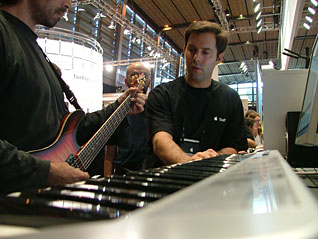
BRINQ is the home of entrepreneur and product designer Patrick Donohue, whose work focuses on high impact startups and products.

Headlines about the assault on the traditional music industry are a common sight, but most often these articles concern the disruption of traditional distribution and sales mechanisms by peer to peer networks and digital media. Yesterday though, the New York Times ran an article describing the latest discordant notes for the music industry, "Home Sweet Studio", detailing the rise of the home recording studio and digital tools for content creation.
"Mr. Pierce is part of a quiet revolution in music-making: the move from professional studios to home recording. Making an album used to mean booking a fixed amount of very expensive time in a well-equipped but unfamiliar room; now, it can be a matter of rolling out of bed and pressing a button. Whether it's Mice Parade's indie-rock, Aesop Rock's underground hip-hop, the twilit ballads of Keren Ann, the mercurial California rock of the Eels or sweeping Top 40 contenders from Moby, more and more music is emerging not from acoustically perfect state-of-the-art studios, but from setups tucked into bedrooms and basements or simply programmed onto a laptop."
Traditional companies in the multi-billion dollar recording industry can be described as providing three major services: distribution & sales, marketing, and recording. The rise of home studios and garage bands foretells the disruption of the third area, recording, but could also have impacts on the first two areas.
Let's pause for a moment and recall the characteristics of a disruptive innovation (summarized from the work of Harvard business guru Clay Christensen):
Do the innovations behind home studios, such as Apple's entry level GarageBand or the more expensive Adobe Audition software packages, meet these disruptive criteria?
They appear to, GarageBand and its successor (GarageBand 2) both offer improvements for the amateur and home recording artist that, though while not up to recording industry standards, allow musicians to put off paying for a professional studio's services for even longer (or perhaps to never). And professional craftsman, such as New York's Perry Yung, a master craftsman and player of shakuhachi (the Japanese bamboo flute), use GarageBand to record tracks to promote their instruments. Meanwhile, iCompositions.com and the Creative Commons alternative copyright allow musicians to collaborate on a previously unheard scale.
Mainstream markets? Certainly not, but these alternative markets allow the all important second criteria of disruptive innovation, a place for the innovation to improve, ignored and unrestrained by its mainstream competitors. Furthermore, the way in which people are using music may be changing, and at the very least their listening habits are. Will the music industry change to suit, or will disruptive competitors step in? From the Times article:
"And there's a certain symmetry in the fact that the music that emerges from home recording is increasingly heard by one person at a time, between the headphones of portable music players like the iPod. The sounds musicians have made alone at home end up in an equally private sphere."

So why is this interesting to us here at BRINQ, where our tune is about promoting the creativity and innovation of the world's poor in the Base of the Pyramid (BOP)?
We view these innovations as enabling technologies and the BOP as a place to incubate disruptions. Home studio innovations like GarageBand could enable the affordable placement of small recording studios within the reach of more of the world's poor, many of whom have a very strong musical tradition. Could this give birth to local music industries and innovations? Well, we believe that some very creative music would result, but we can't say for certain how such innovations and markets would roll out, nor would we want to. Successful entrepreneur and world changer Tom Chappell (of Tom's of Maine fame) put it to us best:
"I got to where I am today not because I knew what to do, but because I asked questions and took the best answers I found."
In other words, those innovations will evolve in ways that we can't foresee, but hopefully with the right questions, in ways that we can recognize. GarageBand and other home studio innovations allow the playing of new melodies, new questions asked for the first time and in places unheard of before.
Never undervalue the opportunity to ask a new question; and remember, even discordant notes can blend together into beautiful symphonies.
Past "Innovation from the Brinq" articles:
Bambucicletas and Other “Cycles” of Innovation –Poor People’s Knowledge – India - Innovation Central – Building a Better ATM – Keeping it Cool - Clay Pot Refrigeration